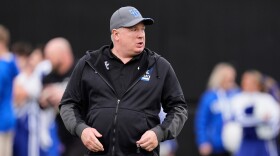A week before the Derby, 29-year-old Sergio Navas is sprinting to the track at Churchill Downs after a long morning of grooming and readying horses.
He’s an assistant trainer who started working at the backside of Churchill Downs 11 years ago.
“Every single trainer, everyone wants to win races, so that’s the dream we have. Every single morning, we work hard to do this,” he said.

For Navas, the grind doesn’t end after the Derby. It’s tough work taking care of horses and competing in races across the country — the days start at 4 a.m and can go 12 to 14 hours, seven days a week .
Hundreds of Latino immigrants work with the horses and help shape Kentucky’s horse racing economy and culture. Many, like Navas, live in dorms on the track, others in their own homes near Churchill Downs.
Navas migrated to America from Santa Rosa, Guatemala, at 18. His coworkers hail from Mexico, Honduras, Peru and Venezuela.
He sends most of the money he makes to his wife and kids back home, and said he wants to bring them to America once he can afford a house and a comfortable life here.
“I want to keep working here, that way I can help them. I’ve been here 11 years and I never went back to Guatemala, so I miss my family,” he said.
Black Americans were prominent as jockeys and support workers in Kentucky’s horse racing industry for decades. But in the late ‘70s, they no longer wanted to accept poor work conditions, and younger generations sought jobs outside the racetrack.
That’s when trainers recruited immigrants from Latin America to fill the gap, taking on roles ranging from horse groomers to leading jockeys.
At the track kitchen where workers line up for lunch, Roberto Gonzalez is taking a break from manning the field.
He’s a security guard at Churchill Downs who moved to Kentucky in 1986 from his home city of Cuernavaca, Mexico. Factories in his home city were closing, and the destruction from the 1985 Mexico City earthquake drove him to consider moving to America.
He heard of a job grooming horses at Churchill Downs from a family friend.
“When I came, there were only a few people, maybe 20 people. Now it’s 200, 500, 1,000 people,” he said.

From grooming to hotwalking, he’s done it all. Getting a day off is a luxury, and Gonzalez said it’s hard to tell the days apart.
“Every day is Monday here. You don’t know when it’s Tuesday, Monday. It’s the same because you work every day, you do the same things every day with the horse,” he said.
Gonzalez said when he arrived, he didn’t really have anyone to guide him through this strange new world. Now he sees it as his responsibility as an elder to help the young, new workers and fold them into the backside community.
“I want to be someone who can tell them, ‘Here’s where you can go to learn English,’ or, ‘Here’s where you get the cheapest groceries, don’t go to the other grocery stores!’” he said. “I see me when they come, you know, I want someone to have me if you’re alone or lonely.”
Luis de Leon, a musician who was previously a journalist in Guatemala, said the backside can feel like a space that moves differently from the rest of the city.
“[Backside] doesn’t feel like what you’d typically think Louisville would be, and you’re transported to a world where people are trying to survive and make it in America while also looking out for each other,” he said.
For Gonzalez and Navas, the backside is really a town within Churchill Downs, an ecosystem built on shared struggles and joys.
Karina Barillas is executive director of La Casita Center, a Louisville nonprofit that provides support and resources to Hispanic and Latino immigrants.
She said adjusting to a country where you don’t know the language is hard, but she’s glad this community isn’t experiencing a culture loss.
“One thing that I really love is the resiliency of not getting assimilated by mainstream culture, but to keep our culture. That’s what I like to say, all the Derby horses are Spanish-speaking horses,” she said.
Ed DeRosa of Horse Racing Nation said fans should learn about the essential work by people of color at the Kentucky Derby.
“I don’t think a lot of people, a lot of casual racegoers, know that when they’re here at Churchill Downs on the first Saturday in May, you’re at the home of these people who make the game go,” DeRosa said.
On a recent Saturday evening, Sergio Navas is adjusting his black cowboy hat and blue silk shirt before he hits the stage at a Mexican restaurant in south Louisville. He’s talking through his set list with a coworker who’s also drummer in his band Complices De La Sierra. The dance floor crowds up in less than an hour, and the tequila is flowing.

Every weekend, the track workers' community comes together at a restaurant for a party with different kinds of entertainment. Sometimes, it’s Navas’ band. Other times, it’s a salsa dancing competition.
“Everyone thinks I’m very happy here, but there’s a lot on my mind with problems here and in Guatemala. But every time I get to sing, I sing for the people so they can enjoy it. I try to make the heart happy for everybody,” he said.
The party is a respite from a long week of work, and Navas uses it to create a space for joy, celebration and keeping his community’s culture alive.






